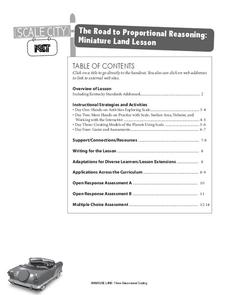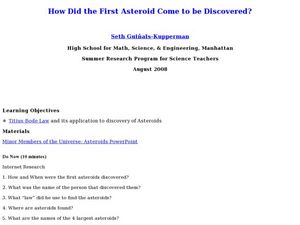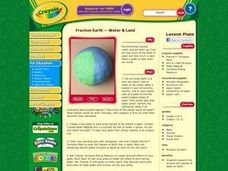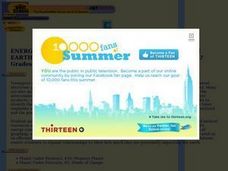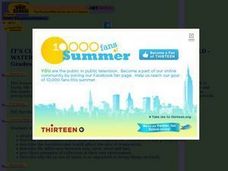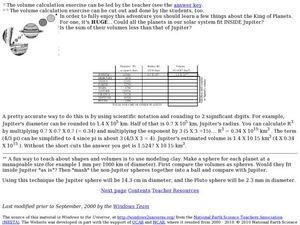Voyage Solar System
Round and Round We Go — Exploring Orbits in the Solar System
Math and science come together in this cross-curricular astronomy lesson plan on planetary motion. Starting off with a hands-on activity that engages the class in exploring the geometry of circles and ellipses, this lesson plan then...
CK-12 Foundation
Venn Diagrams: Planets and Dwarf Planets of the Solar System
Yes, Venn diagrams are helpful in science, too. Learners use an interactive to classify celestial bodies as having moons, as dwarf plants, as both, or as neither. They answer a set of challenge questions based on the Venn diagrams they...
Curated OER
Planet Vacation
In this planets worksheet, students fill out a chart where they fill in the distance each planet is from the Earth, and how much travel time in years and hours it would take to get there. Students do this for 8 planets.
Redefining Progress
Have and Have-Not
Is there a correlation between a country's wealth and the extent of its ecological footprint? What exactly constitutes an ecological footprint, and how does one country stack up against the rest? This is a unique lesson to incorporate...
Curated OER
What Contains Carbon?
Students explore elements by analyzing everyday objects and materials in class. In this carbon lesson, students define several vocabulary terms such as carbon dioxide, hydrocarbon, and carbonate. Students view a group of items,...
Curated OER
You Are Here
Students determine the relative size and distance of the planets in the solar system. They use ratios in their mathematical calculations to make models of the planets after discussing the relative sizes of the planets. They keep a...
Kentucky Educational Television
The Road to Proportional Reasoning
Just how big would it really be? Young mathematicians determine if different toys are proportional and if their scale is accurate. They solve problems relating scale along with volume and surface area using manipulatives. The last day of...
NASA
Make a Planetary Exploration Balloon
Balloons aren't just for parties! An inquiry-based lesson explores the idea of using balloons for space exploration. Learners become engineers as they attempt to control the ascent and descent of a helium balloon using different masses.
NASA
Exploring Exoplanets with Kepler
Calculate the movement and properties of planets like professional astronomers! Scholars use Kepler's third law to find Mercury and Venus's distance from the sun. Using changes in brightness of distant stars and Kepler's third law,...
Curated OER
My Angle on Cooling
Students explore how the angle and distance of an object can change it's temperature. After reviewing how the position of the Earth affects the temperature of the planet, student groups design and perform an experiment to test how...
Curated OER
Global Warming and Climate Change
Students explore the environment by writing a persuasive letter. In this global warming lesson plan, students identify the key problems with our energy consumption in the United States. Students complete worksheets and write a letter...
Texas Instruments
TI-Nspire™
We landed on the moon with less computing capabilities than you can find in this app! Here is a multiple function calculator that takes all the power you get from a handheld and adds the wonderful large screen that only a tablet can...
Curated OER
Measure the Earth's Circumference
Students explore geometry by conducting a science experiment. In this circumference measurement lesson, students review the Greek geographer Eratosthenes who first discovered the circumference of our planet. Students utilize...
Curated OER
Lotto or Life: What Are the Chances?
Though the website does not seem to have the mentioned video, a reding and lottery style games simulate the chances of finding intelligent life somewhere other than Earth. Without the video, this lesson is short, but it can be a useful...
Curated OER
Planetary Landers
Students watch programs from a series titled "Planetary Landers". As a class, they view a poster of various vehicles that have made their way into space. In groups, they brainstorm the characteristics that should be included when...
Curated OER
How Did the First Asteroid Come to be Discovered?
Students examine asteroids including how and when they were discovered. In this asteroid lesson students view a PowerPoint presentation on asteroids.
Curated OER
Comparing Earth and Mars
Students work together to compare and contrast Mars and Earth. Using the internet, they answer questions given to them by their teacher and calculate answers showing their work. They graph their answers and discuss the results of the...
Curated OER
Fraction Earth -- Water and Land
Students research the amount and sources of water on Earth. They interpret data to create a physical representation of water and land mass on the planet. They then use art materials to create a visual and tactile representation of...
Curated OER
Energy Eccentricity
Young scholars assess their own energy use to help develop an awareness of the different types of natural resources affected by consumers. Their calculations show them how much they are personally impacting the Earth. Very meaningful and...
Curated OER
Ratios, Mars and the Internet
Students calculate real ratios that exist between the planets Earth and Mars. After a lecture/demo, students use worksheets and access Internet sites to do their calculations.
Curated OER
It's Clean, Fresh and only Three Billion Years Old - Water!
Students engage in a lesson which explores the wate cycle. They get to see some very entertaining video, do fun hands-on activities and gain a better understanding of evaporation, condensation, precipitation and collection.
Curated OER
Clip the Face
Students discover the moon's phases and the rarity of eclipses. In this lunar lesson, students view a video titled Spin Around the Solar System: A Moon Dance, which demonstrates the key differences between a lunar and solar eclipse....
Curated OER
Volume Calculation Exercise
Middle schoolers work with scientific notation and rounding as they determine volume. In this volume lesson, pupils attempt to calculate the volume of the planet Jupiter. They use rounding to two significant digits and scientific...
Curated OER
Small Angle Calculations
Students work with circles, angles and estimating angles in the night sky. In this circles and angles lesson, students practice measuring a degree using the circumference of a circle and apply the degree to determine a way to use their...
Other popular searches
- Lesson Planet Lo Gin
- My Lesson Planet
- Planet Lesson Plans
- Google Planet Lesson Plans
- Lesson Planet Membership Fee
- Lesson planet.com
- Cost of Lesson Planet
- Lesson Planet Cost
- Creative Lesson Planet Earth
- Planets Lesson Plans
- Lesson Planet Home Page
- Lesson Planets Phone Number








